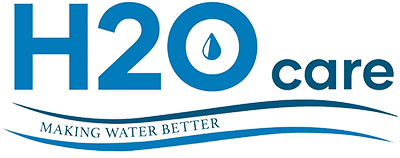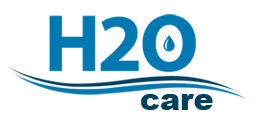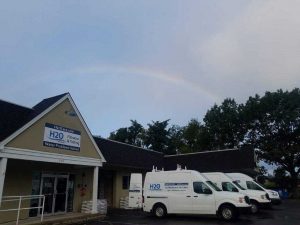WATER SOFTENER / WATER FILTRATION OPTIONS
Water filtration or a water softener system may greatly benefit your Dunstable home’s water quality. Whether you have the town supplying water to your home or you have a private well, a properly designed and installed system will noticeably improve water quality. Later in this write-up, specific contaminants that are commonly found in Dunstable private wells and the public water supply are identified. Additionally, various effective water quality improvement methods are covered as well. Excellent water quality is achievable with the proper approach, including testing, analysis and professional installation. System maintenance is also important to achieve many years of consistent high quality water and to optimize the useful life of your water softener or water filtration equipment.
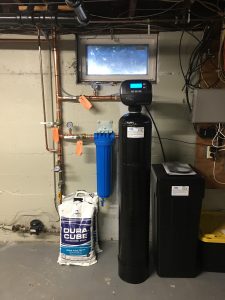
Water Softener & Sediment Filter
A water softener is typically installed to remove hard water minerals, dissolved iron or manganese in the water with a technology called Ion Exchange. If your water test indicates high levels of iron or manganese, an “upflow” water softener is highly recommended to reduce the chance of mineral accumulation in the lower section of the water softener. Particulate manganese or iron (which you can see in the water) can be removed with a properly sized sediment filtration set up. Other types of water filtration systems may be required to remove some of the other contaminants identified in your water test. For additional information on manganese in water, see the article at the following link, Manganese in Water Article in Water Technology. For additional information on Iron in Water, see the article link at Iron Article in Water Technology Magazine.
COMMON WATER QUALITY CONTAMINANTS
Common issues encountered in Dunstable, MA private wells are manganese and iron along with low pH (see below for types of water filtration systems). Additionally, some homeowners are surprised when their water test reveals the health threats radon and arsenic. This is not uncommon in this region. Even in the public water supply, you may notice symptoms of iron, manganese or low pH in the water. For a chart of symptoms, causes and solutions, see the link at Common Regional Water Problems
BAD ODORS & TASTE IN WATER
There are many other types of systems to remove bad tastes & odors, sediment and many other objectionable minerals and contaminants in the water. There are “point of entry” systems that will provide filtration for all of the water entering your home or facility. Also, there are “point of use” water filtration systems that will provide filtered water at a sink or other single point of use, typically by feeding the filtered water to a designated, separate faucet. Starting with a water test will help steer to the right approach for you. For more on bad odors & taste in your water, see the link at https://h2ocare.com/bad-odor-taste/.
RADON & ARSENIC – in private wells
The Arsenic maximum allowable level in drinking water per the EPA is .01 mg/L (miligrams per liter) or 10 parts per billion. For more information on this see the link at DEP Arsenic Link. Removing arsenic from water for the entire home is performed by installing water filtration tanks containing a specific media that grabs the arsenic out of the water. The media inside the tanks have a limited capacity, therefore they must be exchanged out for tanks with new resin at appropriately determined time intervals. A safe system will include a “lead-lag” set up with two tanks in line. Once the media in the first tank is exhausted, the second tank will be in place to continue removing arsenic. To only remove the arsenic from your drinking water, a reverse osmosis purification system can be installed under the kitchen sink or in the basement to feed a separate faucet at the sink. Installing a reverse osmosis system at the point of entry to feed the entire home would be very expensive and not the recommended approach for arsenic removal.
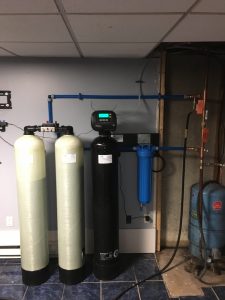
Twin Arsenic system with Ozone
Currently the Massachusetts radon remediation action level is at 10,000 pCi/L (Pico curries per liter) in water. The radon must be removed from the water and it is also recommended testing the air for Radon. Note that New Hampshire requires action if radon is only at 2,000 pCi/L. while Maine and Rhode Island actionable levels are at 4,000 pCi/L. For more radon information see the link at Radon Link. Removing radon from water requires a water filtration system installed at the point of entry, in which the water is agitated in a sealed chamber then vented safely to the outside, sending the radon gas to ambient air. Other technologies and systems are used to remove other contaminants. Any properly designed water filtration system should start with a water test before an informed recommendation can be made.
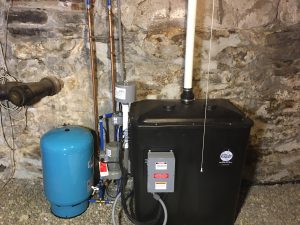
Radon in Water Removal System
